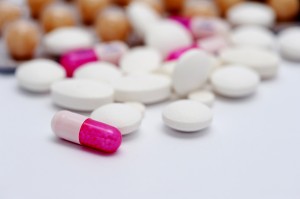
Clinical depression is one of the most common mental health problems occurring in children and adolescents. It is often accompanied or followed by additional negative outcomes, including social and academic problems, anxiety and substance use. Many depressed adolescents continue to have recurring problems throughout adulthood.
A variety of antidepressant drugs, such as tricyclics and selective serotonin reuptake inhibitors (SSRIs) have been developed for treating depressive symptoms. Although these drugs are moderately effective in adults, they are frequently associated with unpleasant side effects. Fewer studies have been carried out in children and adolescents and the effectiveness of tricyclic drugs in particular is unclear. A recent systematic review addressed this question.
Methods
Research databases were searched for randomised controlled trials (RCTs) comparing use of tricyclic drugs to a placebo in depressed children between the ages of 6-18 years.
- The search for appropriate studies was very thorough and included searching the Cochrane clinical trials register, a range of electronic databases, hand-searching key journals and contacting authors involved in relevant work.
- 14 double-blind RCTs were selected for inclusion in the review by two researchers who also independently assessed the risk of bias in these studies.
- 8 studies assessed adolescents aged 12 years and over, 4 studies assessed children under 12 years and 2 studies looked across childhood and adolescence.
- The sample sizes of the studies varied from 7 to 182 participants, with a total of 590 participants.
 Study outcomes, assessed using questionnaires or interviews, were:
Study outcomes, assessed using questionnaires or interviews, were:
- Rates of remission (assessed as yes/no)
- Changes in depression symptom levels
- Presence of negative side effects
Secondary analyses looked at children (6-11 years) and adolescents (12-18 years) separately.
Results
- The studies were generally consistent that tricyclic drugs did not increase rates of remission, as compared with the placebo in either children or adolescents.
- There was a small effect of tricyclic drugs reducing depression symptoms as compared with the placebo, but only in adolescents and only 2 studies showed this effect.
- Children and adolescents receiving tricyclic drugs were more likely to experience vertigo, light-headedness, tremor and dry mouth than those receiving the placebo.
Conclusions
- Tricyclic drugs appear to have little beneficial effect towards treating depression in children and adolescents, although they may have a small effect in adolescents.
- Low doses of tricyclic drugs in children and adolescents are associated with a number of unpleasant but minor side effects.
- The authors note that overdoses of tricyclic drugs (previously reported in the 90s) can have much more damaging side effects and in some cases can even be fatal.
- A different review of newer-generation antidepressants in children suggests a small beneficial effect of these, potentially providing a safer alternative to tricyclic drugs.
Limitations
- Individual studies varied in which tricyclic drugs they tested, how they assessed depression and
 whether they excluded children with additional problems.
whether they excluded children with additional problems. - Several of the studies were quite small and some studies followed up participants only 4 weeks later, which is a short time for any effect to be noticed.
- Only 5 of the studies systematically reported on side effects.
- Risk of bias could not be determined in some of the older studies.
Take-home messages
- This review suggests that tricyclic drugs are not useful for treating depression in children and have only moderate benefits in adolescents.
- The authors urge clinicians to provide accurate information to patients and parents about the uncertainties of benefits and possibiility of side effects of tricyclic drugs.
Links
Hazell P, Mirzaie M. Tricyclic drugs for depression in children and adolescents. Cochrane Database of Systematic Reviews 2013, Issue 6. Art. No.: CD002317. DOI: 10.1002/14651858.CD002317.pub2.


Can babies suffer from depression?
Systematic review finds that tricyclics do not benefit children with depression: Background Clinical depressio… http://t.co/BYWNnQf1CD
I cant help thinking its child abuse putting kids on anti depressants, especially tricyclics
“@Mental_Elf: Systematic review finds that tricyclics do not benefit children with depression http://t.co/L3SLInDYxZ”
Counselling benefits
The review included 16 RCTs of tricyclics versus placebo: http://t.co/bWKN32yYKf
Are SSRIs really “moderately effective in adults”?
The Kirsch analysis suggested that they were essentially useless in mild/moderate depression, although that has been contested. What’s your view?
http://www.alltrials.net/ Unfortunately – we don’t know if it is or not because drug companies have allowed the medical profession to be biased.
RT @Mental_Elf: Pls RT @YoungMindsUK Systematic review finds that tricyclics do not benefit #children with #depression http://t.co/zHBt55mL…
The studies were consistent in finding little or no benefit for tricyclics: http://t.co/bWKN32yYKf
Systematic review finds that tricyclics do not benefit children with depression – The Mental Elf http://t.co/uZxfRMkf5b
MT @mental_elf: The studies were consistent in finding little or no benefit for tricyclics in kids w/depression: http://t.co/3yDruNDGam
There was some evidence of side-effects, such as vertigo, tremor and dry mouth: http://t.co/bWKN32yYKf
On this evidence, tricyclic drugs are not useful for children with depression and only moderate benefit adolescents: http://t.co/bWKN32yYKf
Mental Elf: Systematic review finds that tricyclics do not benefit children with depression http://t.co/s9IRh3dxan